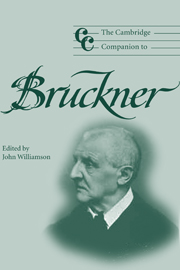16 - The musical image of Bruckner
from Part IV - Reception
Published online by Cambridge University Press: 28 September 2011
Summary
Bruckner reception has long exhausted itself in footnotes to hermeneutics and criticism and in the circumstances of, and commentaries on, performances. The need for a classification of Bruckner literature according to sociological criteria and authors' intentions has only been answered hesitantly. Not until the 1980s did works appear with important consequences for the analysis of authors' strategies. Mathias Hansen stated then that ‘The complicated history of the effect of Anton Bruckner's work is an unparalleled result of the accumulation and intertwining of irrational meanings, which revealed their concrete intentions with ever less pretence since the twenties and were completely exposed under German Fascism.’ By 1991, when the first study of Bruckner anecdotes appeared, reappraisal of Bruckner reception history and its ideology still hardly registered. It still dealt mainly in documenting the dates of reception, which was undeniably necessary and useful. Far-reaching discussions then began with international conferences in the USA and Britain in 1994 and 1996.
Why question the views, intentions, actions, and effects of authors? Is it mostly just a matter of eliciting politico-ideological implications of Bruckner reception and letting them run towards National Socialism? This would certainly be too simple and one-sided. If it is assumed that biographies or general accounts of artists not only represent but also construct and (re)constitute reality, then it is a major purpose of music history to investigate how and why this happened.
- Type
- Chapter
- Information
- The Cambridge Companion to Bruckner , pp. 244 - 260Publisher: Cambridge University PressPrint publication year: 2004

